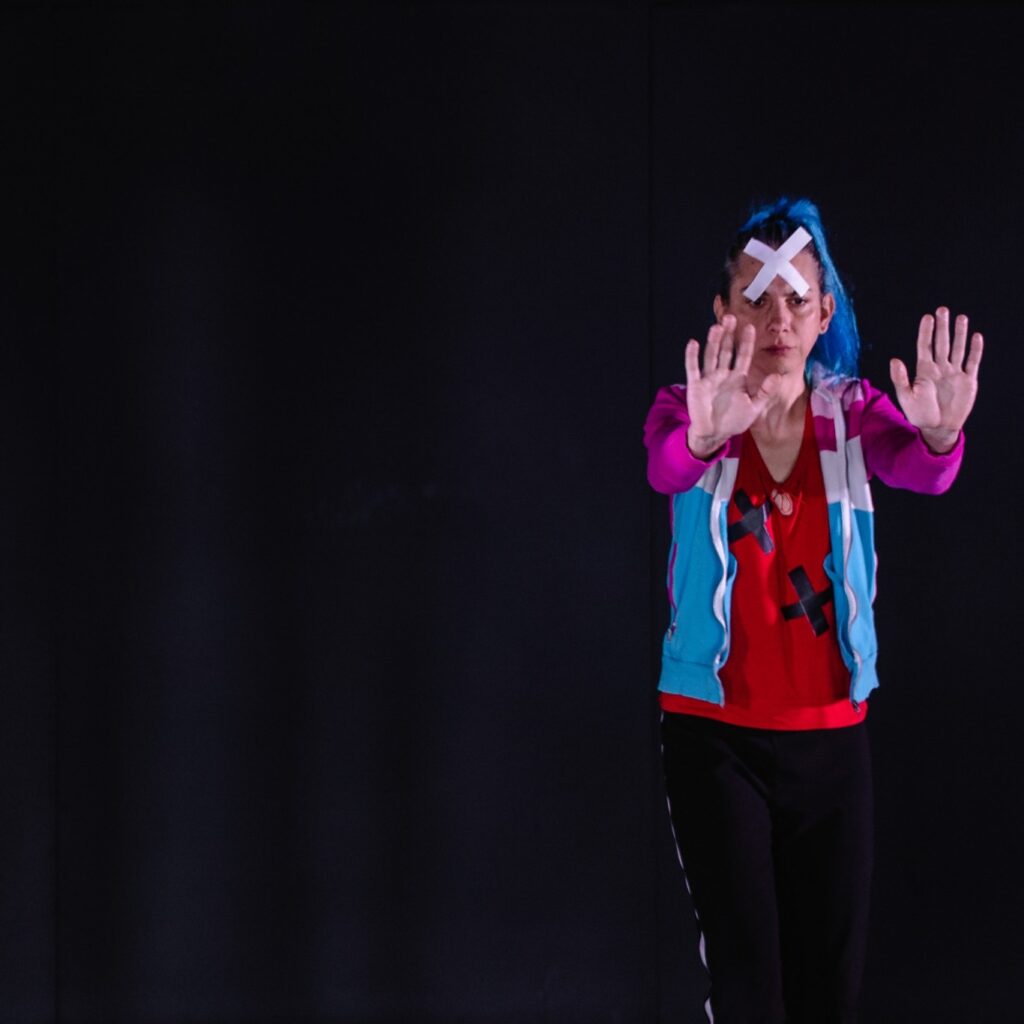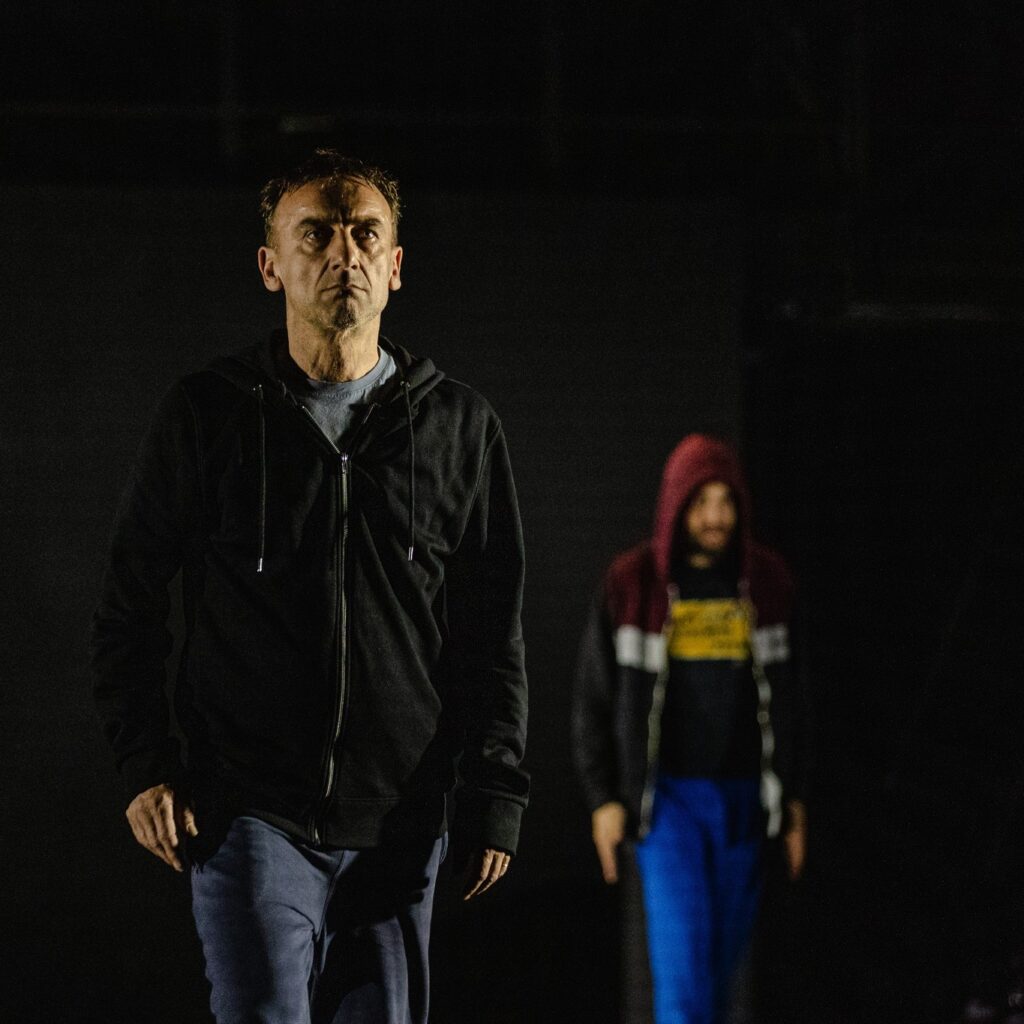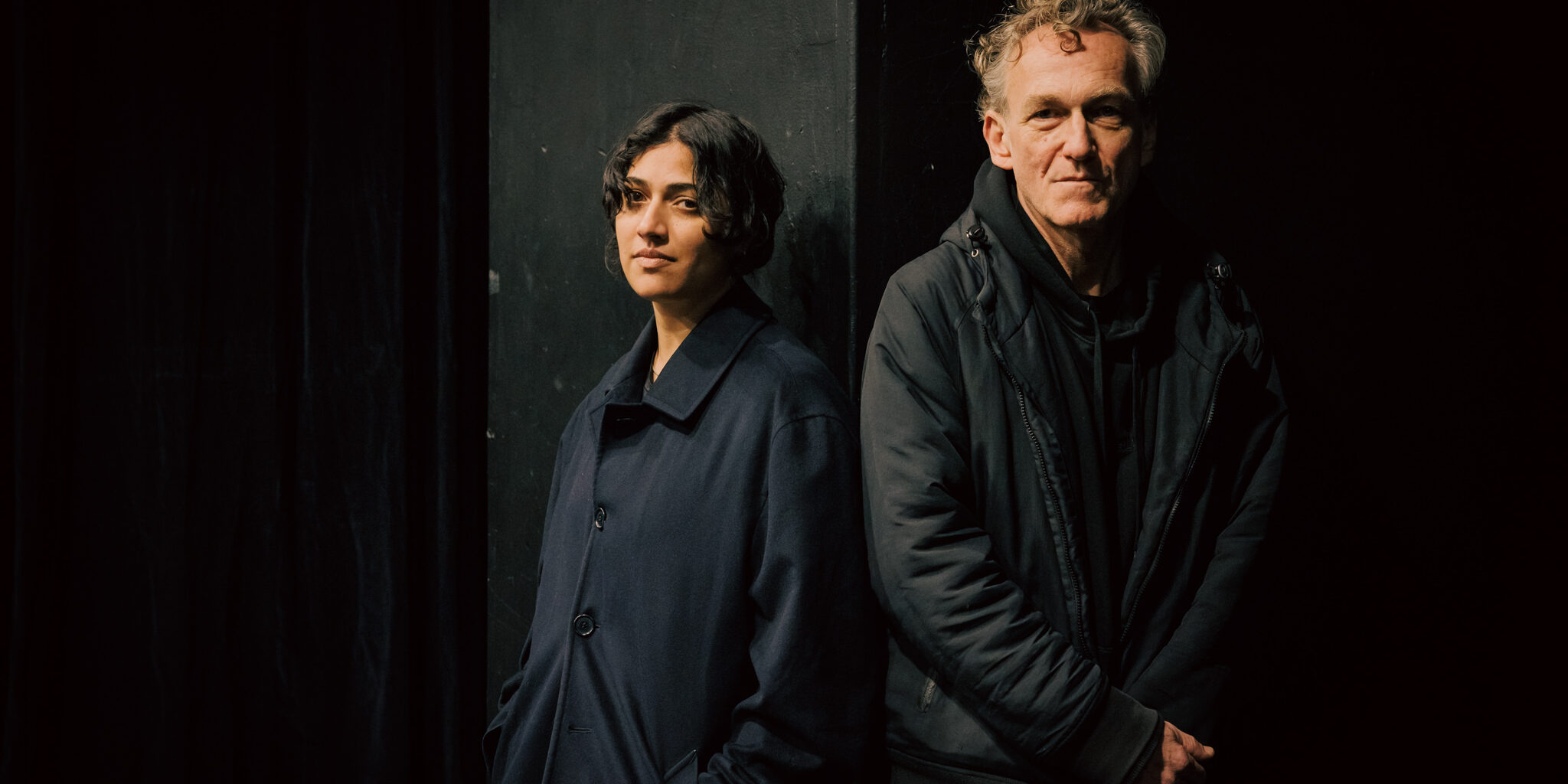Director Sebastian Nübling and musician Jackie Poloni talk to Nick Awde about collaboration, small nations and their new show exploring what it means to be Slovenian today.
The ambitiously titled Slovenija šteje – Slovenia Counts – is a journey through what it means to live in Slovenia, posing and then answering questions that expose the mechanics of the everyday life of citizens in the republic via a fusion of narrative, movement and music. True to the spirit of Slovenia’s Mladinsko Theatre, it’s also a confluence of perspectives as seven actors from Slovenia work with two directors from Germany – theatre director Sebastian Nübling and experimental musician/DJ Jackie Poloni.
It all started with conversations over a few years about a possible collaboration between Nübling/Poloni and Mladinkso artistic director Goran Injac that grew more concrete until the project got the green light and a subject needed to be fixed. At one point, Injac suggested Slavko Grum’s 1930 play An Event in the Town of Goga (Dogodek v mestu Gogi), which depicts a fictitious Slovenian town populated by bizarre isolated characters and filled with gossip and a string of sinister events.
“Grum wanted to capture a picture of the Slovenia of his times,” says Nübling. “And from there we came to wondering whether we should do a contemporary take on this classic text from Slovenian literature, or do we take the idea of his description of the town and apply it to Ljubljana and the people who live there. So we were thinking why not apply the idea? It would be an interesting process since we are two outsiders, both based in Berlin with different passports and different paths. So let’s see what happens when we come to Slovenia with our questions.”
As their next step, Nübling and Poloni assembled a cast and developed with the actors a series of questions based around how life is in Ljubljana in particular and Slovenia in general. The answers that were provided then established a pattern that creates a picture of the Slovenia of our times.
It might seem risky to bring big nation dwellers over to examine what makes a small nation tick, but Slovenia Counts reveals resonances that relate to the rest of us who reside beyond its borders. For example, while Slovenia with a population of just 2.1 million is part of the European Union, it also lies on the EU’s borders – and statistics show that up to 1 million people to date have travelled through its territory from the Balkans, many of them en route to northern Germany.
As a result of their work at Berlin’s Maxim Gorki, Nübling and Poloni bring elements of the theatre’s post-migrant programming that fit the Mladinsko ethic. This shared experience helped the pair in setting up a creative collective arc with the performers, who considered one of the starting points to be theatre, since, just as in other countries of any size, in Slovenia it represents a tight community.
“We worked on this idea of closeness within the idea of the smallness, looking at the strengths and frustrations it gives people,” says Nübling. “We asked what kind of freedom is there in a smaller community where everybody knows everybody and then applied it to the wider society. Are some people comfortable because they have an obvious network while there are others who don’t have easy access to these networks? It’s an ambivalent and even contradictory situation typical of a small nation, and perhaps Slovenia is a more special situation in comparison to other EU small nations.”

Slovenia Counts
Taking the institution of theatre as a lens to the jigsaw of society obviously works, but does framing via the medium itself compromise things?
“That’s an interesting question for me because I don’t have that theatre background,” says Poloni, who also makes music as Yantan Ministry. “Perhaps not so visible in the show, but something that we have talked about extensively, is the role of the institution of theatre in representing or tackling certain conversations that reflect society. An inspirational piece of writing that we came to was an article published recently by Slovenian collective Zasuk (Union of Independent Cultural Workers) entitled ‘When will you be in your eighties?’ (‘Kdaj bo že konev vaših osamdesetih?’, February 2024).
“In it Zasuk questions the role of cultural institutions that are part of the state apparatus. Because they are funded by the state, do these institutions have the ability to enact real change by making the audience witness a critique of themselves? So we’re questioning that idea of implication and how it is part of the whole picture of society, where this form of theatre is merely playing a role within the cultural landscape without actually being able to change much.”
But within a small nation’s cultural landscape, the counterpart, independent theatre, often can’t be sufficiently separate to maintain the independence needed to offer a viable alternative stage for critical thinking – i.e. things can get too comfortable. As Poloni points out: “You can make as many critical pieces as you want, but as long as the material conditions aren’t changed – for example, if there aren’t people telling their own stories – then what is the point, if not self-glorification?”
Nübling adds: “Zasuk also talks about the function of culture in capitalism as a stabilising ideology designed to produce this facade of ‘hey, we are open, we are diverse, we critique, we self-critique!’ – but the background of the policies and the economy are already determined. So culture just colours the facade without changing anything.”
After two decades working in Germany’s city state theatres, Nübling believes in neither messages nor provocation. Theatre audiences, he says, tend to be leftish and middle-class – in Germany at least that’s the core element. “You just give them things even on a provocative level which actually they can think about anywhere. We agree that we need to shock, but to shock the world for what reason?” By taking instead an inclusive, non-confrontational look at the idea of a nation and how it is embodied and reproduced by all of its citizens all the time, Slovenia Counts sparks a conversation that sheer shock value or predetermined message cannot.
The rehearsal process focused on fusing everything into a language that allows the cast to communicate with the audience with music as an omnipresent heartbeat driving the narrative. “It’s like an investigative workout,” says Poloni. ”The difference with music is that it can be taken in very different situations and structures than those found in theatre, which relies on an institution, on groups of people working within a fixed structure. Of course music can have these things or belong in these places too. But if there’s institutional music, there’s also commercial music, it appears in so many kinds of non-cultural institutions. So music as a medium is something that people can claim for themselves in a way which is often more difficult to do with theatre. There’s already a big difference in the way people absorb music compared to how they absorb theatre.”
Poloni agrees with Nübling on the value of sending messages. “I suppose it depends what you mean by message. Do you involve someone in a movement that might tickle something, open a thought, an unfamiliar position, or should it be attractive? Is this is my message and you have to adopt it or you have enjoy it? Everything can end up flattening down into a line of entertainment, which is risky given the topics at hand in life today. So when it comes to messaging it’s a risk to put entertainment in so close. If I want to entertain, I can DJ.”

Slovenia Counts
Structurally, Slovenia Counts is a show that is performative – it doesn’t start from the text. A constant wave of actors comes to the audience, disappears and comes back in a loop before bouncing off in other directions to explore whatever topics emerge in the process. As dramaturgs, Goran Injac and Deja Crnović have brought their insights to shaping the narrative. “They translated and monitored the level of language and tone,” says Nübling. “But the words come straight from the actors. They have drawn on their own experiences and opinions to develop the text, and the beat/movement helps to get them talking without having to go to the front of the stage and deliver a monologue. At times individual, at others collective, the themes share feelings of struggling with their position in society – ‘what am I in this room but also in this bigger vessel we call Slovenia?’”
Poloni notes that they did a lot of work around notions of self-mythologisation within the country, the sort of narratives that become embodied and made into material reality through repetition. “Then what do these narratives mean if they are applied to other aspects of life in Slovenia, where every person, like in any country, has these inbuilt responses or narratives that they can’t help reproducing?”
The musical elements reflect the repetition of this underlay, seemingly an alternative soundtrack for the nation. “But it’s not a soundtrack, it’s an influence,” Poloni points out. “I’m trying to keep it as functional as possible where the beat or soundscape is part of the actors’ movement – it’s not soundtracking what they’re doing but an accompaniment and the two things come together. The movement then gets extended along with its meaning to the point where the narratives have their space, as if you were to zoom in on something very small and then see it just as it is, and from there something else develops.”
Poloni’s music is therefore not there to support scenes to give them a touch of emotion. “It’s always present, influencing what’s happening on stage,” says Nübling. “So whether the actors follow or don’t follow, they have to somehow position themselves within the music. It’s not strictly choreographed, so there has to be some freedom – not to go in every direction possible but in the direction in which we all know where we’re going to make every performance a bit different.”
Adds Poloni: “What I’m finding nice about this process is that there aren’t any big eureka moments. There’s just a constant flow of now and then something seeming to come together, something emerges and something clicks. A lot of it has to do with people listening to each other and being aware of each other in the space and responding naturally with their instincts and opinions.
“Working this way with Sebastian relates to a lot of what I adopt in my own work. The space and performance allows me to open up thoughts and methods of participating that are closed off to me in my own practice for material reasons. For me, collaborating like this in theatre definitely opens up the work.”
For more information, visit: Mladinsko.com
Further reading: interview with Goran Injac: “I’m always looking for ways to initiate a public debate”
Nick Awde is a journalist, playwright, editor, critic and producer. Based in the UK, he is co-director of Morecambe's Alhambra Theatre. Books include Equal Stages (diversity and inclusion in theatre), Mellotron, Women In Islam, and translations of plays by other writers. Much of his work focuses on ethnoconflict and language/cultural genocide.








